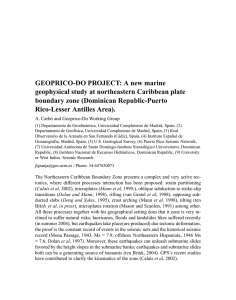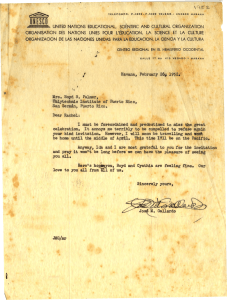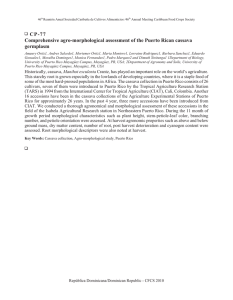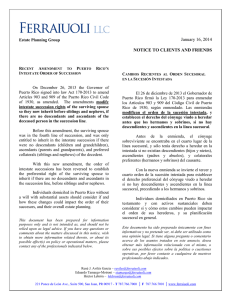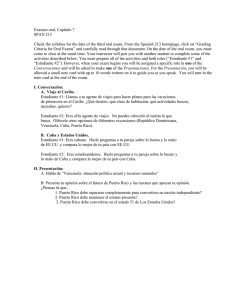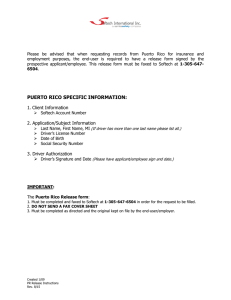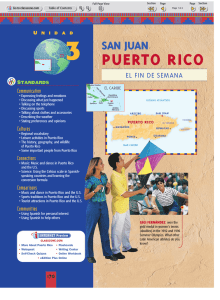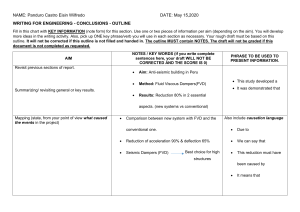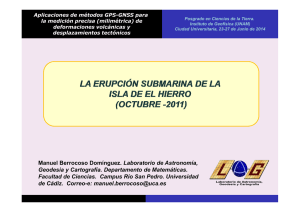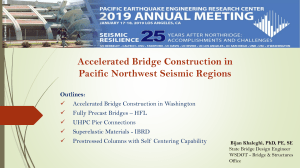EGU05-A-09767 - Copernicus Meetings
Anuncio
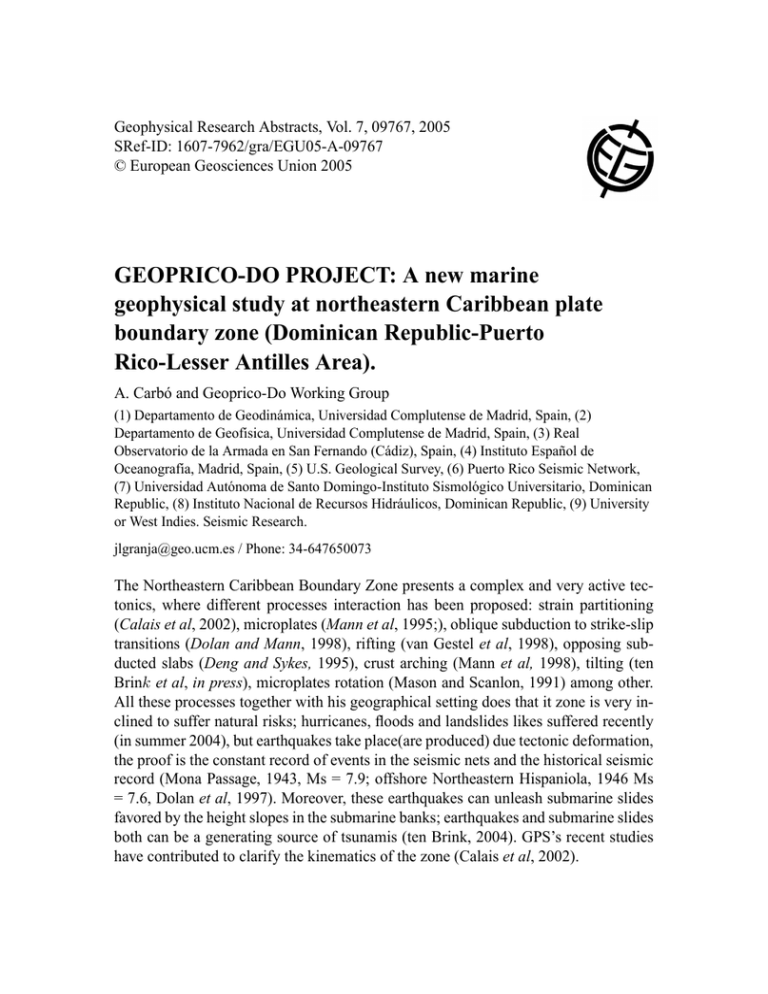
Geophysical Research Abstracts, Vol. 7, 09767, 2005 SRef-ID: 1607-7962/gra/EGU05-A-09767 © European Geosciences Union 2005 GEOPRICO-DO PROJECT: A new marine geophysical study at northeastern Caribbean plate boundary zone (Dominican Republic-Puerto Rico-Lesser Antilles Area). A. Carbó and Geoprico-Do Working Group (1) Departamento de Geodinámica, Universidad Complutense de Madrid, Spain, (2) Departamento de Geofísica, Universidad Complutense de Madrid, Spain, (3) Real Observatorio de la Armada en San Fernando (Cádiz), Spain, (4) Instituto Español de Oceanografía, Madrid, Spain, (5) U.S. Geological Survey, (6) Puerto Rico Seismic Network, (7) Universidad Autónoma de Santo Domingo-Instituto Sismológico Universitario, Dominican Republic, (8) Instituto Nacional de Recursos Hidráulicos, Dominican Republic, (9) University or West Indies. Seismic Research. jlgranja@geo.ucm.es / Phone: 34-647650073 The Northeastern Caribbean Boundary Zone presents a complex and very active tectonics, where different processes interaction has been proposed: strain partitioning (Calais et al, 2002), microplates (Mann et al, 1995;), oblique subduction to strike-slip transitions (Dolan and Mann, 1998), rifting (van Gestel et al, 1998), opposing subducted slabs (Deng and Sykes, 1995), crust arching (Mann et al, 1998), tilting (ten Brink et al, in press), microplates rotation (Mason and Scanlon, 1991) among other. All these processes together with his geographical setting does that it zone is very inclined to suffer natural risks; hurricanes, floods and landslides likes suffered recently (in summer 2004), but earthquakes take place(are produced) due tectonic deformation, the proof is the constant record of events in the seismic nets and the historical seismic record (Mona Passage, 1943, Ms = 7.9; offshore Northeastern Hispaniola, 1946 Ms = 7.6, Dolan et al, 1997). Moreover, these earthquakes can unleash submarine slides favored by the height slopes in the submarine banks; earthquakes and submarine slides both can be a generating source of tsunamis (ten Brink, 2004). GPS’s recent studies have contributed to clarify the kinematics of the zone (Calais et al, 2002). The Northeastern Caribbean Boundary Zone (Hispaniola and Puerto Rico zone) has been widely studied from 50’s, but mainly the studies have developed northern Hispaniola and Puerto Rico islands (e.g. Puerto Rico Trench, Bahamas Bank, Mona Rift, (Mann et al, 1995; Dolan et al, 1998; ten Brink et al, 2004)), staying the zone of the south without scarcely coverage of information. During April, 2005 marine geophysics cruise aboard the Spanish Research Vessel “Hespérides” northeastern edge of the Caribbean plate has been realized, inside the project GEOPRICO-DO in which collaborate U.S. Geological Service (USGS), Puerto Rico Seismic Net (University of Puerto Rico, Mayaguez’s Campus), Universidad Autónoma de Santo Domingo-Instituto Sismológico Universitario and the Red Sísmica of the Instituto Nacional of Recursos Hidráulicos of Dominican Republic, all them coordinated from the Univesidad Complutense de Madrid (Geodynamics Department, Geophysics Department, Spain) Real Obsevatorio de la Armada San Fernando (ROA,Spain), Instituto de Español Oceanografía (IEO). The input data acquired in the cruise involved; multibeam bathymetry, potential fields (gravity and magnetism), multichannel reflection seismic, deep seismic sounding with record on stations in land and streamer and OBS on sea. Besides the OBS will remain seabed by constant record for 6 months. We present here the data acquired during the recently finished survey and some preliminary results: geomagnetic anomaly maps, gravimetric (Free Air and Bouguer) anomaly maps, some seismic profiles, etc. at northeastern Puerto Rico Trench and in the south of the Hispaniola and of Puerto Rico islands (Muertos Trench). In the next steps all data integration will allow to elaborate crustal models through the plates boundary and their lateral variations, what contributed to clarify complex tectonics in this zone.
